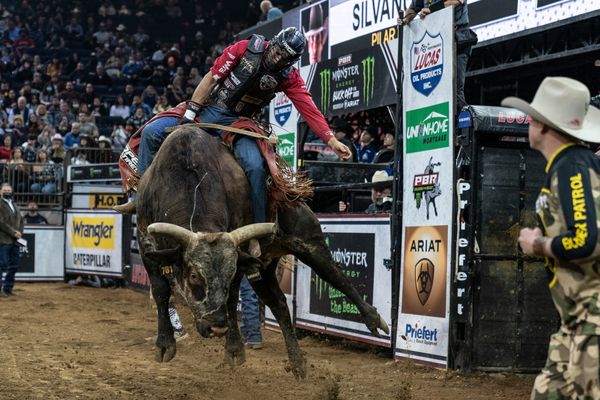Professional Bull Riding (PBR) is coming to Greenville on Saturday, January 22 at 7pm. For the third time, the Pendleton Whiskey Velocity Tour will return to Bon Secours Wellness arena where top bull riders in the world will compete for coveted ranks.
To learn more about one of the most dangerous sports in the world, The Paladin reached out to Bryan Titman, a 123 world ranked bull rider from East Bernard, Texas. As a child, Titman followed in the footsteps of his father and grandfather and began bull riding at a young age, starting on young steers and sheep. According to Titman, bull riding is “all I ever wanted to do, and all I ever wanted to be.” He has now competed in Professional Bull Riding for a decade.
Bull riding guidelines have evolved over time. Current rules indicate that riders must stay on the bull for at least 8 seconds. They are only allowed to hold on with one hand. If a rider’s free hand touches themselves or the bull, they are disqualified. The riders are judged on their performance. Spurring the bull boosts their scores. Techniques may vary, but for Titman, balance is the most essential skill for a bull rider to have. He also noted that the mind is “90 percent of it.”
Given the danger of the event, an ambulance is required to be on standby. Like many other professional riders, Titman has experienced his fair share of injuries. After suffering a broken pelvis and hip after a bull flipped over him, he said, “I got a lot more metal back in my body, so I’m put together.” Despite the threat of physical harm, Titman values the sport and “being able to put smiles on people’s faces and make an impact.”
PBR events are large-scale, sophisticated productions. According to PBR’s “Bull Riding Basics” information page, “PBR is a unique blend of sports and entertainment.” The tour has transformed bull riding from community rodeo events to large-scale productions, incorporating concert-like elements such as pyrotechnics. Tour manager Robert Simpson says, “in about two hours, we give [the audience] a ton of action.” The events are broadcasted on CBS and other streaming services such as Pluto TV, reaching out to audiences worldwide. PBR has a dedicated and growing fan base, notably in countries outside of the United States such as Brazil as well as locally in Greenville. Titman says he and the other riders “definitely feed off of the energy” of the crowd.
Bull riding is a contentious sport. Multiple animal rights groups such as People for the Ethical Treatment of Animals (PETA) and the Royal Society for the Prevention of Cruelty to Animals (RSPCA) have claimed that bull riding is detrimental to the animals. RSPCA considers bull riding to provoke “fear and stress” in the animals and that “cattle are prey animals and their reaction to being ridden in this way is the same as their reaction to being attacked by a predator.”
PBR has vehemently contested that bull riding is an inherently abusive sport to the animals. Both Titman and Simpson both spoke about the way in which they work alongside the bulls. Simpson compared the treatment of bulls to “how they treat thoroughbreds on a racetrack.” The bulls are highly trained and on specific eating plans. Bulls have also been bred to buck. As for Titman, “the bulls come first, they get better treatment than we do.”
For Titman, the PBR World Finals in Fort Worth Texas in May are quickly approaching. Winning and receiving the prized gold buckle would “mean a lot” to him. Titman and other athletes competing on the road to the world championship will be at Bon Secours on Saturday ready to ride.
